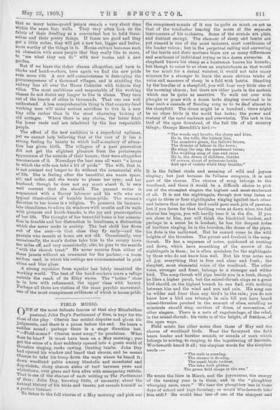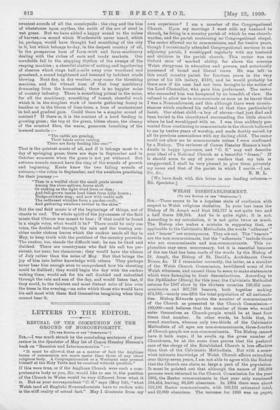FIELD MUSIC.
ONE of the most delicate fancies of that airy Elizabethan pastoral, John Day's Parliament of Bees, is kept for the close of the play. Oberon bas settled disputes and given his Judgments, and there is a pause before the end. He hears a sudden sound ; perhaps there is a stage direction lost. "—Field-mug° P Oberon must away," he proclaims. What does be hear P It must have been on a May morning ; you get the sense of a door suddenly opened into a green world of thrushes singing, rooks cawing, bleating lambs. Sohn Day bad opened his window Mad heard that chorus, and he meant Oberon to take his troop down the ways where be heard it; down woodland paths among bluebells and mosehatel and dog-violets, along shaven aisles of turf between yews and vantethorn, over grass and fern alive with scampering rabbits. That is one of the Charms of such writing as The Partiament of Bees ; John Day, knowing little, of necessity, about the natural history of his birds and beasts, yet reveals himself as a perfect listener.
To listen to the full chorus of a May morning and pick out the component sounds of it can be quite na =eh an art as that of the conductor hearing the notes of the Separate
instruments of his Orehestra. Some of the sounds are plain and distinct enough. The Clamour of sheep and litnibe not yet weaned is one of the most insistent, most continuotis of the louder voices ; but in the perpetual calling and answering of the lambs and their mothers there are as many differences
and semitones of individual crying as in a dozen nurseries. A shepherd knows his sheep as a huntsman knows his hounds ;
but though to come to so close an acqimintance as that would be too much for a casual watcher, it would not take many minutes for a stranger to learn the more obvious tricks of voice and manners of sheep in a fold with lambs. Standing by the hurdles a a sheepfold, you will hear very little else of the Morning chorus ; but there are other parts in the anthem which can be quite as assertive. To walk out over wide ploughs or grass with a dozen larks singing overhead is to hear such a cascade of flooding song as to be deaf almost to the sheepfold. The dozen might be a hundred ; there might be no other birds in the world but larks; the power and ecstasy of the carol embrace and overwhelm. The lark is the bird of the open downland, of the full life of all country things; George Meredith's bird
"The woods and brooks, the sheep and kine, He is, the hills, the human line, The meadows green, the fellows brown,
The dreams of labour in the town;
He sings the sap, the quickened veins{ The wedding song of sun and rains He is, the dance of children, thanks Of sowers, shout of primrose-banks And eye of violets While they breathe."
It is the fullest circle and meaning of wild and joyous singing ; but just because its fullness conquers, it is not part of the chorus. The chorus of song belongs to the woodland, and there it would be a difficult oholoo to pick out of the strongest singers the highest and most exuberant of all. It is not the nightingale, though you may listen at night to three or four nightingales singing against each other and believe that no other bird could pour suclajets of passion; but if you listen for that thrilling voice at dawn when the full chorus has begun, you will hardly hear it in the din. If you are close to him, you will think the blackbird loudest, and perhaps in a sense be is loudest; he has the deepest notes of baritone singing, be is the bourdon, the drone of the pipes, his flute is the mellowest. But he cannot come to the wild heights of the thruelies. The purest and freshest is the song- thrush. He has a sequence of notes, quickened at evening and dawn, which have something of the sorrow of the nightingale in them; he is often mistaken for the nightingale by those who do not know him well. But his true notes are all joy, everything that is free and clear and fresh; the simplest, most elemental voice of the woodland. The other voice, stronger and freer, belongs to a stronger and wilder bird. The song-thrush will pipe beside you in a bush, though be likes a higher perch, but the ma:eel-thrush sings as a great bird should, on the highest branch he can find, with nothing between him and the wind and sun and rain. His song can be wilder and freer than any bird's in the rain ; you do net know how a bird can triumph in rain till you have heard missel•thrushes perched in the summit of elms, carolling as minstrels should sing, careless of dress, of convention, of
other singers. There is a note of vagabondage, of the rebel, in the missel-thrush; his voice is of the height, of freedom, of
the open ways.
Field music has other notes than those of May and the chorus of Woodland birds. Near the farmyard the field hears louder and harsher sounds, or sounds of work which belongs to sowing, to reaping, to the ingathering of harvests.
Wordsworth heard it all; the simplest Words for the 'simplest needs :— The cock is crowing, The stream is flowing, The small birds twitter, The lake doth glitter, The green ideld sleeps in the sun."
He wrote the lines in March, and the joyousness, the energy of the turning year is in them, and in the "ploughboy whooping anon, anon." We hear the ploughboy less in these days of school and high farming; or would Wordsworth hear him till P He would hear less of ono of the sharpest and
sweetest sounds of all the countryside : the ring and the hiss of whetstones upon scythes, the swish of the arc of steel in wet grass. But we have added a happy sound to the noises of harvest,—a sound which Wordsworth never heard, which he, perhaps, would have thought had something of the city in it, but which belongs to-day, in the deepeat country of all, to the prosperous hum of farm-work and farm-machinery dealing with the riches of corn and ready markets. Our cornfields fall to the slapping rhythm of the sweeps of the reaping machine ; a cheerful clatter of cutting and ingathering of sheaves which rings half-a-mile away over woodland and grassland, a Bound heightened and lessened by indolent winds blowing. Next day, in dry weather, may come the threshing machine, and the vibrant hum of that busy. machinery drumming frOm the homestead ; there is no happier noise of country industry. There is something primal in the noise, for all the machinery, something of honest, cheerful work which is in the simplest work of insects gathering honey in heather or in the bloom of lime-trees, a hum of contentment in toil and gradual gain. Could there be a simpler sound of content P If there is, it is the content of a herd feeding in growing grass ; the tug at the green, bitten stems, the champ of the crushed fibre, the warm, generous breathing of the lowered nostrils :—
" The cattle are grazing, Their heads never raising, There are forty feeding like ono!"
That is the quietest music, of all, and if it belongs most to a day of springing grass, there are days in September and in
October summers when the grass is not yet withered. But autumn sounds cannot have the ring of the sounds of growth and beginning. Keats knew the two falling sounds of autumn,—the robin in September, and the swallows practising for their journey :- "Then in a wailful choir the small gnats mourn Among the river-Bellows, borne aloft
Or sinking as the light wind lives or dies ; And full-grown lambs loud bleat from hilly bourn ; kedge-crickets sing; and now with treble soft The redbreast whistles from a garden-croft; And gathering swallows twitter in the skies."
But the real field music is of the beginnings of things, not of chants to end. The whole spirit of the joyousness of the field music that Oberon was meant to hear ; if that could be found in a single voice, what would it be P There could be only one voice, the double call through the rain and the tossing sun- shine under riotous leaves which the cuckoo sends all day in May, to keep truth with the prettiest of the country proverbs. The cuckoo, too, stands the difficult test; he can be liked and disliked. There are countrymen who find his call too per- sistent, too near, too clamorous ; they would have the silence of July rather than the noise of May. But that brings the joy of him into better knowledge with others. They perhaps never hear him enough even to comprehend how his shouting could be disliked; they would begin the day With the cuckoo waking them, would ask for his call doubled and redoubled
through the rain and sun of the day, and would listen last, if they could, to the faintest and most distant echo of him over the trees in the evening,—an echo which those who would have his call most with them find themselves imagining when they cannot hear it.











































 Previous page
Previous page